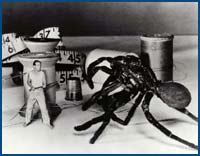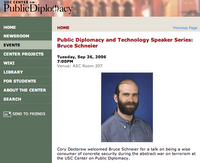No, not that sort.
George Gilder in Wired Magazine article
"The Information Factories" is talking about “Peta” as in that prefix “signifying numbers of the magnitude 10 to the 15th power, a million billion.” He writes about the already started shift from desktop to so-called "cloud computing."
Two things interest me here. First, how critical water (as it relates to energy) may be for the internet age and 2) how the current parallel computing architecture may run counter to the fundamental laws of technology.
First, water: All this computing takes a staggering amount of electricity, much of it for airconditioning! Describing Ask.com’s data farm:
If it's necessary to waste memory and bandwidth to dominate the petascale era, gorging on energy is an inescapable cost of doing business. Ask.com operations VP Dayne Sampson estimates that the five leading search companies together have some 2 million servers, each shedding 300 watts of heat annually, a total of 600 megawatts...With a third of the incoming power already lost to the grid's inefficiencies, and half of what's left lost to power supplies, transformers, and converters, the total of electricity consumed by major search engines in 2006 approaches 5 gigawatts... Air-conditioning will be the prime cost and conundrum of the petascale era. As energy analysts Peter Huber and Mark Mills projected in 1999, the planetary machine is on track to be consuming half of all the world's output of electricity by the end of this decade.
The article also notes how Google is building a massive, 30 acre data farm right next to the Columbia River gorge. Two reasons make this the perfect site for a next-gen data center. First, because it is close to PC-1, the main fiber-optic artery that connects Asia to the US.
The other attraction is The Dalles Dam and its 1.8 gigawatt power station. The half-mile-long dam is a crucial source of cheap electrical power – once essential to aluminum smelting, now a strategic resource in the next phase in the digital revolution. Indeed, Google and other Silicon Valley titans are looking to the Columbia River to supply ceaseless cycles of electricity at about a fifth of what they would cost in the San Francisco Bay Area. Why? To feed the ravenous appetite of a new breed of computer.
Maybe we can't throw out
all of the old rules. Geography might matter after all; natural resources sure do. The New Yorker has a great article on the desperate need for water in the developing world – India in particular is crippled by its inability to solve this basic need, despite its brilliance in software development. Sadly, they don’t have it online, but here is a
link to an interview with the author.
In the second half, Gilder points out how parallel architecture is starting to look like the mainframes of yesterday. This is his central thesis ever since he wrote
Telecosm: dumb networks with smart edges prevail over smart networks with dumb edges. He seems to suggest that Google may be in for a fall (albeit a long way off) if it remains dedicated to its massive, smart architecture.
Google's magical ability to distribute a search query among untold numbers of processors and integrate the results for delivery to a specific user demands the utmost central control. This triumph of centralization is a strange, belated vindication of Grosch's law, the claim by IBM's Herbert Grosch in 1953 that computer power rises by the square of the price...
In this way, the success of the highly centralized computer-on-a-planet runs counter to the current that has swept the computer industry for decades. The advantages of the new architecture may last only until the centripetal forces pulling intelligence to the core of the network give way, once again, to the silicon centrifuge dispelling it to the edges. Google has pioneered the miracle play of wringing supercomputer performance from commodity CPUs, and this strategy is likely to succeed as long as microchip progress remains in the doldrums. But semiconductor and optical technologies are on the verge of a new leap forward… Such advances promise to transform the calculus of storage, bandwidth, and power that gives centralization its current advantage. As the redoubtable Bell Labs engineer turned giga-investor Andy Kessler tells me, "It's sure to happen. It always has. Because all the creativity, customer whims, long tails, and money are at the network's edge. That's where chipmakers find the volumes that feed their Moore's law margins. That's where you can find elastically ascending revenues and relentlessly declining costs."






















